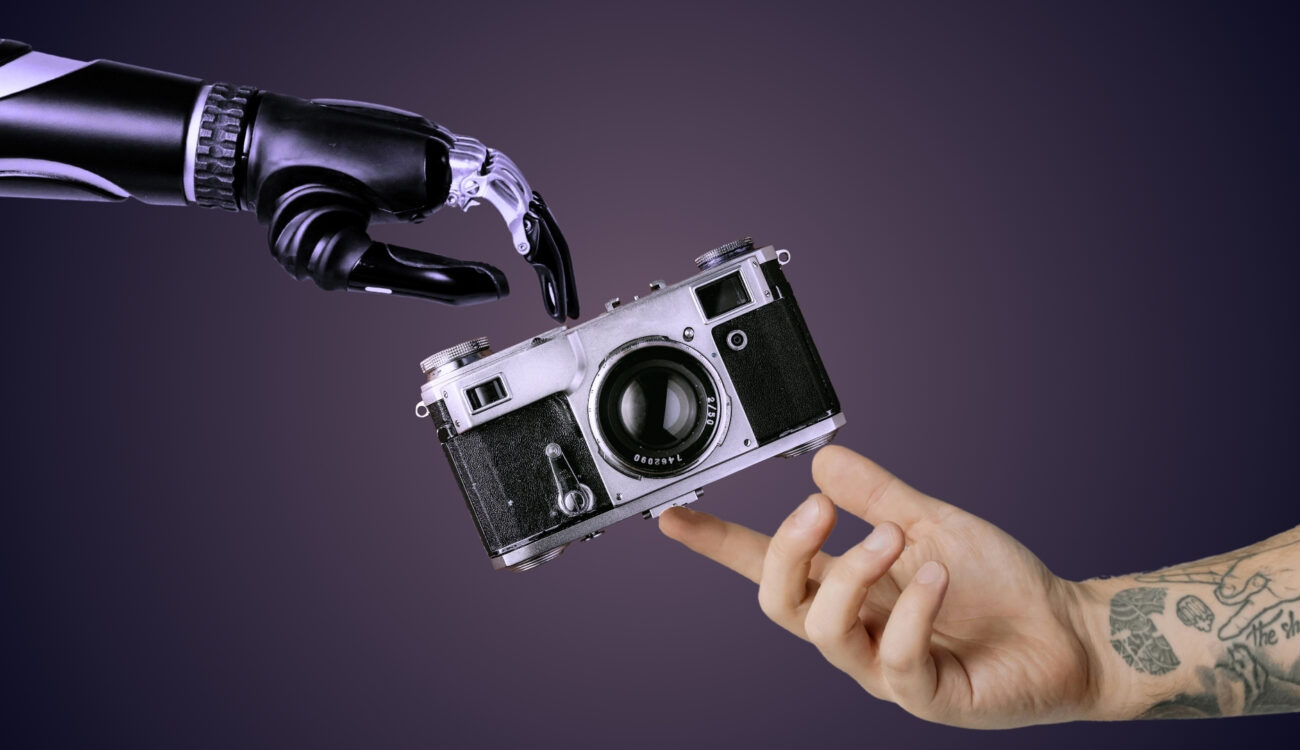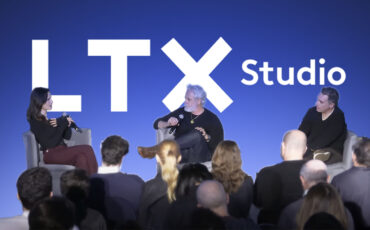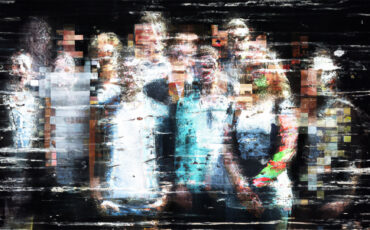
Generative Artificial Intelligence has become a hot topic this year, sparking strong reactions from some of our audience. Many accuse CineD of actively promoting this rapidly advancing technology, which they view with concern. Our genuine intention is to inform our followers of the current developments and hopefully make them more knowledgeable. After all, KNOWLEDGE IS POWER, and if you have the power, you can also control your professional future.
A decade ago, CineD (or cinema5D as it was known back in the day), was “accused” of promoting the DSLR revolution. Some professionals even highlighted the fact that we were promoting the use of small cameras with large sensors instead of sticking to traditional video cameras.
A lot of water flowed under the bridge, and the “futuristic” DSLR revolution became “the actual defacto present.” Some long-standing professionals found themselves out of work, while many others gained recognition and built successful careers by EMBRACING CURIOSITY and understanding that adapting to the ever-evolving world of filmmaking was essential for continued success.
But, the current development and rapid evolution of AI for video is nothing like we’ve ever seen before. Theoretically, this article could be outdated by the time it is published. New tools for video editing, audio manipulation, voice-over, transcription, screenwriting, and more are hitting the market faster than I can change my socks. (OK, almost).
GenAI – who is responsible for the outcome?
It would be naive to think that generative artificial intelligence will only impact our filmmaking bubble. The technology is becoming so advanced that creating “deep-fake” content can truly harm the world. Those who are in charge of regulations are clueless at this point and very much lagging in finding solutions to ensure our safety.
Recently, in an interesting conversation that I had with Lightricks Co-Founder and CEO Zeev Farmban, I tried to better understand the perspective of “responsibility” from someone who is deeply involved in developing AI tools. LTX Studio claims to aid with screenwriting, storytelling, voiceover, music, and more. One thing that occurred to me during that talk is that we should not expect developing companies to take any responsibility for their creations. There are two main reasons for my assumption. The first is that any current “security measure” (watermarking, for example) can easily be bypassed. The other is that the power of home computing continues to grow, and it might be that in no time, powerful AI processors will be available to anyone at a very competitive price. Then, individuals, too, will be able to render their footage without the need for a “middle party” host. What seems to be a possible solution relies on the internet providers’ footsteps themselves. They were forced before to block certain types of pornography (and they did), so hopefully, they will be required to do the same with AI-generated content. Regardless, I truly hope that all those well-paid experts who claim to know and understand their field will come up sooner rather than later with an appropriate regulation(s) solution(s) to this issue. Otherwise, we will all feel the true meaning of chaos.
GenAI in our filmmaking world
So while it is a “global issue” that crosses countries and professions, I would like to concentrate solely on our industry, although some elements in this article will clearly overlap with what’s happening in the greater world of content creation.
The reality is that even today, some tasks being performed by many of us can be replaced by AI. Check next month, and there will be things that AI can do better and more accurately. Now, as creators who are watching these enormous changes happening in front of our eyes, what is our role, and how should we respond to it? Should we stick our heads in the sand, pretending that this generative AI wave is just a passing nightmare, and ignore the reality of what’s happening around us? Or maybe it’s the realization that all those years spent perfecting our craft are now at risk that puts us in a melancholy mood?
Personally, I’ve yet to see how panicking, in general, solves an issue. It’s not for nothing that the slogan “Keep Calm and Carry On” became a motivational poster by the United Kingdom government in 1939. So can we “keep calm and overcome AI”? Let’s try and dive into the diverse options we might have.

I strongly advise anyone who is keeping his/her brain busy with the possible consequences of generative AI for video to break this vast topic into easier-to-digest segments:
Acknowledgment:
The sooner one realizes that this “thing” is really happening and not going anywhere, the faster one can dive into finding appropriate solutions.
Wondering if my role in current production is at risk:
What do you do for a living? Are you a cameraman, editor, colorist, soundman, director, producer, songwriter, musician? (And the list, of course, goes on). Try and identify the current AI trend and see what those who are developing AI tools are aiming at. It could be that your current job on or off the set is not really targeted by AI.
OK, I’m a cameraman and I see that many of those AI tools will eventually replace my role, so what next?
Well, not so fast. It very much depends on the type of production you do. Anything related to narrative filmmaking that deals with people is here to stay and won’t be replaced. For example, are you filming weddings, documentaries, or news? It seems that you are safe. Nothing is likely to replace the subjects you’re capturing anytime soon.
Painful, but needs to be considered
Some AI tools will require practice and professionalism. It can be that if you fear for your job but still want to play a role in this industry, learning some of the apps/software proposed might put you in an advantageous position.
I’m a one-man band. Should I fear losing my clients?
Well, in recent years, many of us creators evolved into a “jack of all trades, master of none”. In some productions, our filmmaking field meant lower budgets and smaller crews. This trend has led some of us to develop a primary expertise (for example, camera work), and next to it, we know how to do “other stuff” like editing or using some color grading tools. Next to that, we had to refine our taste in music and learn how to use tracks from online platforms. Now, GenAI could further intensify this trend by making us even more self-reliant. We will need to familiarize ourselves and work with some of the new tools, enabling us to adapt to the client’s budget and specific needs.
Who should fear losing his/her job?
As far as I’m concerned, the main risk falls on those catering to the commercial industry. A LOT of what we see today on those spots can be done with GenAI, and don’t be fooled, “the agency” that was so proud of your work before might not think twice about cutting the cost and presenting their client a “better-valued option,” next to being “trendy.” At this stage currently, companies and agencies are actually pushing in this direction, hoping to ride on the vibes of curiosity.
Next in line are those earning from stock footage and licensed music. Logically, some platforms offering this kind of service might suffer badly as generating a missing clip will become easier, faster, and potentially more cost-effective. When it comes to music, a few of the sites offering the possibility to generate AI music are now being chased by some big studios. (A bit of a Déjà-vu, I must say, as we have been in this “movie” before when Napster and Co. were targeted by the powers that be).
Justice?
The main question remains open. All those shiny new AI tools must practice on something, and that “something” is material that we all worked hard to deliver. In so many cases, what we produced found its way to the net, uploaded by us or others. If you think that you are safe by not uploading any material online, think twice. As we heard from Lightricks CEO, they are now working closely with some TV stations going through their archives to train the different AI models.
So let’s conclude by saying there is no way to prevent material supplied by us from being “scanned,” serving as the source of a learning center for the “machines.” But who is paying us for that? I don’t see any of the leading companies volunteering to do so, and in all honesty, I cannot even see a proper way to determine individual compensation. I’m afraid that here we have already lost the battle. By the time we knew what was coming, the horses had already run.
A non-final thought
Strikes and petitions won’t slow down this upcoming revolution. There are also too many powers who are not necessarily associated with our industry and have different priorities and interests. So, what really remains essential is to stay informed, identify new opportunities, and solidify your position, especially if you’re working in productions centered around people.
That’s it. A long article that still feels like only touching the tip of the iceberg…
If you have any constructive advice for fellow working people, please be kind and share it with us.
Images credit: https://www.pexels.com, cottonbro studio, and Tara Winstead (Modified by CineD).



























